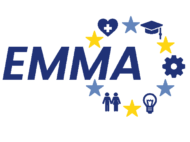The EMMA consortium, spread throughout Europe are developing an interdisciplinary master’s programme. A major stage of this which is underway is constructing the content of the master’s in healthy and active ageing, we wanted to know what our stakeholders thought important too. All of us working on the EMMA project collaboratively devised a survey, incorporating the results of a structured literature review (discussed in an earlier blog). The survey was distributed in Slovenia, Finland, Portugal, Greece, Ireland, and Austria. We heard from diverse education and employment backgrounds and age-groups, including current and recently graduated students, employers, academics, and other stakeholders such as older person advocacy groups, which adds a richness to our understanding of what our stakeholders deem important.
We received very informative data which is being used to create a relevant and forward-thinking master’s degree. Many told us what they thought active ageing meant, and we have so far identified interesting themes which have emerged from the different countries. What stood out in all countries, though, was the idea that participation in society is a key aspect of actively ageing. Participation in, and feeling a part of, society is important for all of us as we get older.

There was strong support for health-related topics, particularly health promotion and healthcare in general. In addition to this focus, there was also support for the promotion of a holistic view of ageing. The importance of health as we age is well-established, yet we know that there is more to ageing well. Psychological well-being, social connection, and physical activity were also highlighted. Interestingly, the climate action aspects of our survey weren’t that popular, suggesting that people don’t automatically associate ageing with climate issues, even though older people are particularly vulnerable to climate change effects such as air pollution, floods, extreme heat events and fires. An earlier blog post reflects further on how relevant the two actually are. Similarly, ‘policy’ and generic skills didn’t capture the imagination of our survey group, so we need to look again at whether and how they are incorporated into the master’s.
Many respondents added valuable course content ideas that the consortium and published studies in the literature didn’t yet consider, such as spirituality in older age and discrimination in the workplace. Detailed aspects of how the master’s should be delivered, particularly links with local and relevant organisations, were suggested. Employability of our future graduates was raised, encouraging the consortium to deeply consider the avenues of those graduating from our programme – how best can we give them the skills, competences and confidence to truly make a difference? We are still working on that one…

The EMMA consortium aims to create meaningful impact the ageing people of Europe. Through delivering a master’s programme which considers the preferences of potential students, academic teaching staff, future employers, and older people, we hope to achieve a well-informed group of professionals equipped to tackle the challenges of our ageing world.
As the curriculum development progresses, we will be sharing updates through our blogs and social media accounts. Follow us to stay up to date!
Author information
Daisy Wiggin, MSc
Research Assistant
Centre for Gerontology and Rehabilitation, School of Medicine, University College Cork, Ireland.


